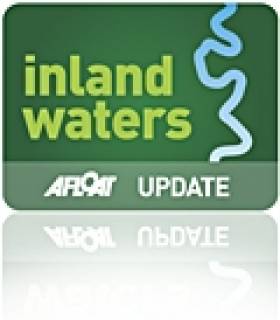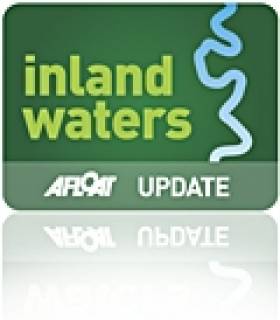Displaying items by tag: Sinn Fein
Minister Has Little to Report on Ulster Canal Project
#INLAND WATERWAYS - Three months on from Minister Jimmy Deenihan's statement on the Ulster Canal regeneration project, and there is little to update on its progress.
As reported on Afloat.ie last December, the Minister for Arts, Heritage and the Gaeltacht replied to a written question from Cork East Sinn Féin deputy Sandra McLennan that the project is "progressing'"despite a U-turn on Government funding, and confirmed that Waterways Ireland would solely fund the scheme from its annual allocations.
However, the minister's latest response - to a question from Cavan-Monaghan Sinn Féin TD Caoimhghín Ó Caoláin requesting an update on the project's progress - is almost identical to his previous statement.
One small difference is an acknowledgement that Cavan County Council has granted planning permission for the project, which involves restoration of the canal between Clones in Co Monaghan and Upper Lough Erne.
Minister Deenihan also stated that his department is "finalising terms of reference" for the proposed inter-agency group that would examine ways to further the project, but gave no timeframe as to when this group would be established.
Ulster Canal Project 'Progressing' Despite U-Turn on Govt Funds
#INLAND WATERWAYS - The Ulster Canal restoration project will be funded by Waterways Ireland alone, at least for the time being, according to the Minister for Arts, Heritage and the Gaeltacht.
Responding in the Dáil to a written question from Cork East Sinn Féin deputy Sandra McLennan, Minister Jimmy Deenihan said that while the previous Government had committed in 2007 to covering the full capital costs of the project, estimated at €35 million, such was no longer viable in the current climate.
"Government accounting procedures do not provide, in that sense, for the ’ring-fencing’ of funds for projects of this nature," said the minister, who added that he was "advised that it was always the intention that the Ulster Canal project would be funded from the Waterways Ireland annual allocations" as well as "projected income from the commercialisation of certain Waterways Ireland assets", though he admitted this had been affected negatively by the economic downturn.
However, Minister Deenihan noted that the project - involving restoration of the canal between Clones in Co Monaghan and Upper Lough Erne - is "progressing incrementally" and that a planning application submitted in October was a "significant milestone".
He also confirmed that he intends "to continue to explore all possible options that may assist in the advancement of this project", which may involve an inter-agency group between the relevant county councils and interested bodies to examine ways of advancing the scheme.
Labour Manifesto Leads the Way on Irish Maritime Affairs
Fine Gael has told Afloat.ie details of its marine policy will be published in its manifesto tomorrow. If that's the case things are looking up for anyone interested in seeing Ireland develop the valuable waters that surround it.
After searching for references to 'sea', 'marine' or 'maritime' only the Labour party has so far made the only significant written commitment to the marine sector in its programme for government. Its manifesto acknowledges that Coastal Communities, Fisheries and the Marine face major challenges in the years ahead, but it is also an area of major economic potential.
Fianna Fail merely says on page 21 of its manifesto that it will ensure that 'an inter-departmental strategy is in place to improve the leisure potential of our harbours and increase marine tourism'.
The Green Party 'Renewing Ireland' document says it will promote the creation of marinas and youth and child friendly water sports to encourage activity and awareness of our maritime country. It also says Ireland will participates in the North Seas Offshore Grid Plan.
There is no reference to the marine in the Sinn Fein 'There is a Better Way' manifesto.
Four party manifestos are available to download below.
Labour's priority will be to develop Ireland as a European hub for seafood processing, which will create sustainable, value-added jobs in coastal communities.
Labour will also develop an Irish seafood strategy to grow the market profile and demand for Irish seafood products. We will support the development of sustainable aquaculture and fish farms by streamlining the licensing process and reducing, as much as possible, the associated bureaucracy. To further assist the development of the sector, responsibility for maritime policy will, as far as is practicable, be concentrated in one department.
Labour will establish a Sea Fisheries Sustainability Impact Assessment based on consultation with all major stakeholders. This report will be brought before the Dáil on an annual basis before EU fisheries negotiations commence, and will ensure that there is a regular evaluation of Irish fish stocks and the effectiveness of current policy and quotas.
Labour is open to the experience and expertise of those whose livelihoods depend on maritime activity. The Department of Agriculture, Fisheries and Food will engage in an ongoing structured consultation with industry representatives, the marine scientific community and other stakeholders to enable them to contribute to national maritime policy.
Finally, safety at sea and decent working conditions must underpin the development of the fisheries sector. Labour in government will ensure that the Irish Coast Guard has access to an Emergency Towing Vessel.
Dun Laoghaire People before Profit candidate Richard Boyd Barrett who has campaigned under a 'Save our Seafront' banner in the last council elections, is holding a meeting tomorrow night in Dun Laoghaire, the country's largest boating centre to protest against the possible 'privatisation' of the town's harbour.
We're tracking the progress of maritime affairs in the general election and posting details on afloat.ie. Whether you're a candidate or a vote please get in touch with your #ge11 marine news. Contact us via facebook, twitter or our website.
































































